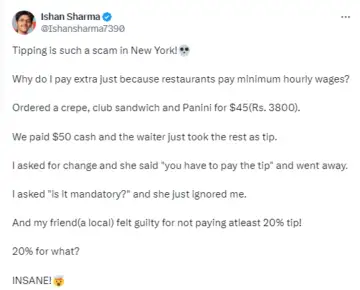A Bengaluru-based YouTuber, Ishan Sharma, recently found himself at the centre of an online backlash after expressing his displeasure with the tipping culture in New York. Currently touring the US, Sharma took to social media platform X (formerly Twitter) to share his experience at a New York restaurant, where he claimed a waiter refused to return his $5 change after he paid a $50 bill for a $45 meal.
The Incident
In his post, Sharma detailed his visit to the restaurant, where he ordered a crepe, a club sandwich, and a Panini, totalling $45 (approximately ₹3,800). After handing over $50 in cash, he expected $5 in change but was surprised when the waiter kept the amount as a tip. When Sharma questioned whether tipping was mandatory, the waiter reportedly ignored him, leaving him frustrated with what he described as a “scam.”


Sharma wrote, “Tipping is such a scam in New York. Why do I pay extra just because restaurants pay minimum hourly wages? We paid $50 cash and the waiter just took the rest as tip. I asked for change and she said ‘you have to pay the tip’ and went away. INSANE.”
Online Backlash
Sharma’s post quickly went viral, drawing criticism from numerous users who defended the tipping system in the US. Tipping is a deeply ingrained practice in American culture, where it is customary to leave a tip of 15% to 20% of the total bill before taxes. This system is crucial for many service industry workers, as tips often constitute a significant portion of their income, supplementing lower base wages.
One user responded, “Stop being cheap,” while another pointed out, “15-20% tip is a customary social custom in the USA. When in Rome, do as the Romans do.” Others expressed disappointment in Sharma’s expectations, with one user commenting, “Pretty sad to see young, educated and high-earning Indians continue to drive this low abundance mindset behaviour.”

Understanding the Tipping Culture
In the US, tipping extends beyond just restaurants. It is also common for services like taxi rides, hotel housekeeping, and personal care. While tipping is technically optional, it is widely accepted as a way to reward good service and support workers whose wages are often lower than the minimum standard.
Sharma’s experience has sparked a broader discussion on cultural differences and expectations when travelling abroad. While his criticism highlights the challenges some visitors face in adapting to different practices, the overwhelming response suggests that understanding and respecting local customs is crucial for a positive experience.
